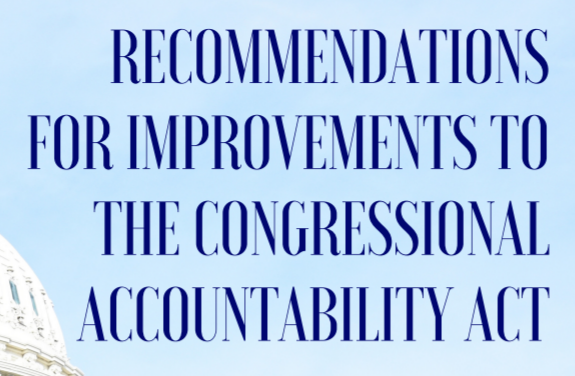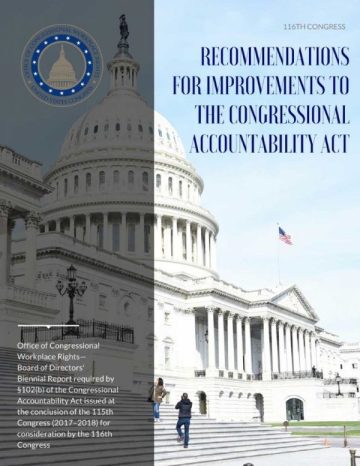STATEMENT FROM THE BOARD OF DIRECTORS
The Congressional Accountability Act of 1995 (CAA) embodies a promise by Congress to the American public that it will hold itself accountable to the same federal workplace and accessibility laws that it applies to private sector employers and executive branch agencies. This landmark legislation was also crafted to provide for ongoing review of the workplace and accessibility laws that apply to Congress. Section 102(b) of the CAA thus tasks the Board of Directors of the Office of Congressional Workplace Rights (OCWR)—formerly the Office of Compliance—to review legislation and regulations to ensure that workplace protections in the legislative branch are on par with private sector and executive branch agencies. Accordingly, every Congress, the Board reports on:
whether or to what degree [provisions of Federal law (including regulations) relating to (A) the terms and conditions of employment (including hiring, promotion, demotion, termination, salary, wages, overtime compensation, benefits, work assignments or reassignments, grievance and disciplinary procedures, protection from discrimination in personnel actions, occupational health and safety, and family and medical and other leave) of employees; and (B) access to public services and accommodations]…are applicable or inapplicable to the legislative branch, and (2B) with respect to provisions inapplicable to the legislative branch, whether such provisions should be made applicable to the legislative branch.
This section of the CAA also requires that the presiding officers of the House of Representatives and the Senate cause our report to be printed in the Congressional Record and refer the report to committees of the House and Senate with jurisdiction.
On December 21, 2018, as we were in the process of finalizing our Section 102(b) Report for the 115th Congress, the Congressional Accountability Act of 1995 Reform Act, S. 3749, was signed into law. Not since the passage of the CAA in 1995 has there been a more significant moment in the evolution of legislative branch workplace rights. The new law focuses on protecting victims, strengthening transparency, holding violators accountable for their personal conduct, and improving the adjudication process. Some of the changes in the CAA Reform Act are effective immediately, such as the name change of our Office, but most will be effective 180 days from enactment, i.e., on June 19, 2019.

